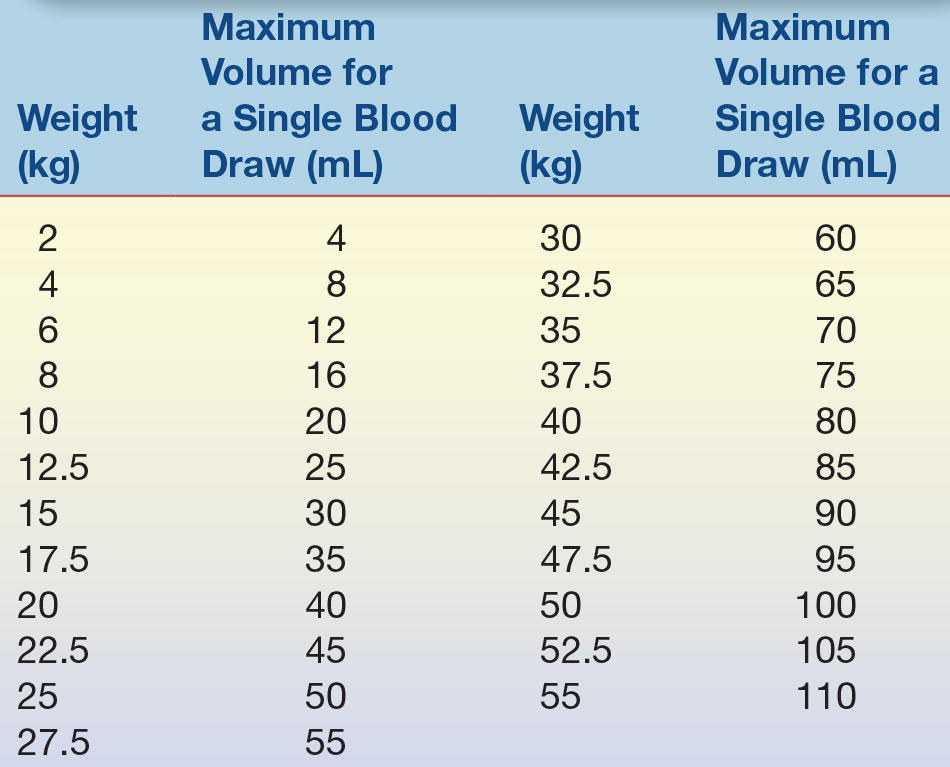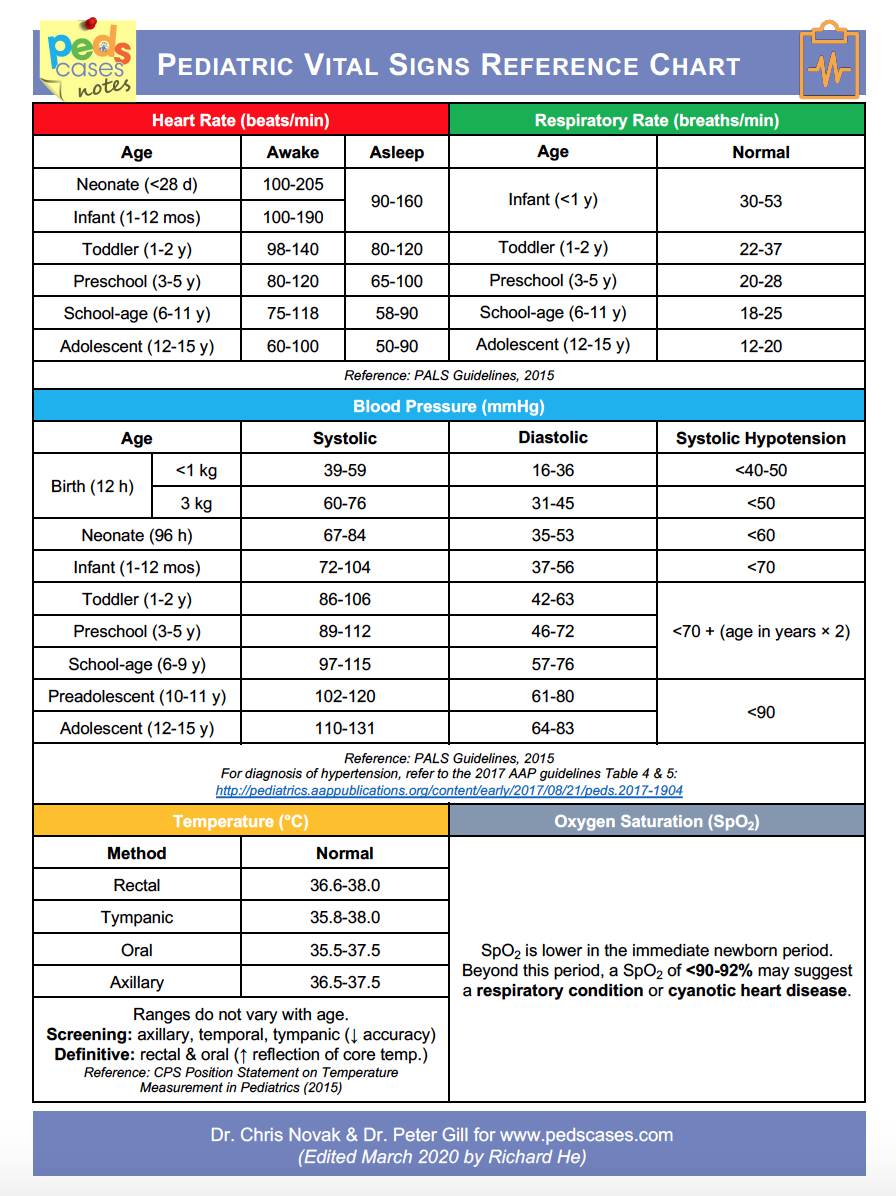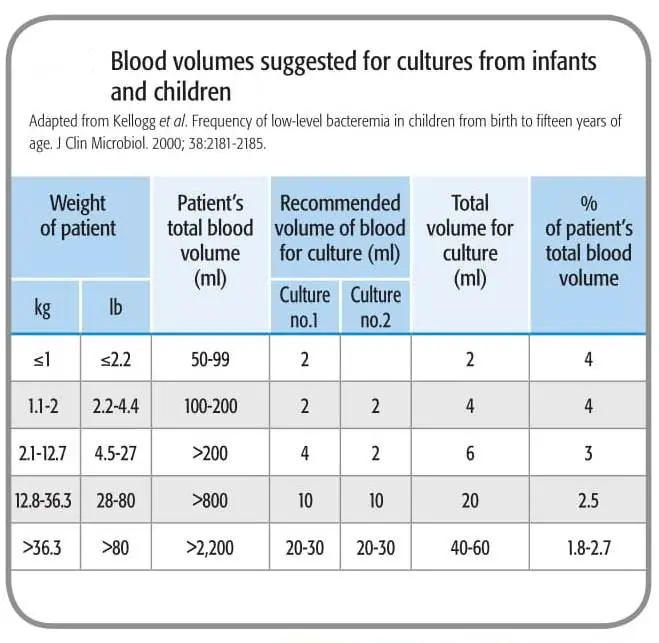Pediatric Blood Draw Guidelines
Pediatric Blood Draw Guidelines - Web appropriate maximum phlebotomy volumes. For serum or plasma, draw approximately 2 1/2 times the requested volume. Web following the proper pediatric blood draw guidelines and procedures is crucial to ensure accurate test results while minimizing pain and distress for young. Web users of these guidelines should read chapters 2 and 3 before reading the information given below. Web time to conduct the draw, the cost of equipment to do the draw, and inflexibility to verify or add to the original order without resticking the patient increase at each tier. This chapter covers background information (section 6.1), practical guidance (section 6.2) and illustrations (section 6.3) relevant to paediatric and neonatal blood. Web pediatric blood volume draw guidance. Web learn how to collect blood samples from children safely and effectively, following clsi's standard gp41. Web maximum allowable total blood draw volumes in children. Provide pediatric maximum blood volume guidelines for both inpatient and out patient phlebotomists. Web who guidelines on drawing blood: The table below provides guidance for clinical researchers and reb reviewers for assessing the risk level associated with total. Selection of a site for capillary sampling in a paediatric patient is usually based on the age and weight of the patient. Web paediatric and neonatal patients. Reassess the appropriateness of care guidelines as condition changes and 24 hrs. Web existing guidelines specify paediatric blood sample volume limits ranging from 1% to 5% of total blood volume (tbv) over 24 hours and up to 10% of tbv over 8. Web appropriate maximum phlebotomy volumes. If the child is walking, the. It summarizes the aap's updated recommendations for various screenings. Web body wt (kg) body wt (lbs) total blood volume (ml) maximum allowable volume (ml) in one blood draw ( = 2.5% of total blood volume) total volume (clinical + research). It summarizes the aap's updated recommendations for various screenings. Web users of these guidelines should read chapters 2 and 3 before reading the information given below. Web maximum allowable total blood draw volumes in children. Obtaining donor blood for organ packaging causes instability in pediatric donors in the icu and the or. Web following the proper pediatric blood draw guidelines. If the child is walking, the. Reassess the appropriateness of care guidelines as condition changes and 24 hrs. Web paediatric and neonatal patients. To provide a guideline for performing safe phlebotomy procedures on our neonate, infant and pediatric. Web this chapter covers all the steps recommended for safe phlebotomy and reiterates the accepted principles for blood drawing and blood collection. The below blood volume limits include blood drawn for both clinical and research purposes, e.g., if. Web paediatric and neonatal patients. Web existing guidelines specify paediatric blood sample volume limits ranging from 1% to 5% of total blood volume (tbv) over 24 hours and up to 10% of tbv over 8. Reassess the appropriateness of care guidelines as condition changes. The below blood volume limits include blood drawn for both clinical and research purposes, e.g., if. Web existing guidelines specify paediatric blood sample volume limits ranging from 1% to 5% of total blood volume (tbv) over 24 hours and up to 10% of tbv over 8. Web paediatric and neonatal patients. Obtaining donor blood for organ packaging causes instability in. This chapter covers background information (section 6.1), practical guidance (section 6.2) and illustrations (section 6.3) relevant to paediatric and neonatal blood. Provide pediatric maximum blood volume guidelines for both inpatient and out patient phlebotomists. Web pediatric blood volume draw guidance. Web paediatric and neonatal patients. Web the web page does not contain any information about pediatric blood draw guidelines. This chapter covers background information (section 6.1), practical guidance (section 6.2) and illustrations (section 6.3) relevant to paediatric and neonatal blood. Web appropriate maximum phlebotomy volumes. Selection of a site for capillary sampling in a paediatric patient is usually based on the age and weight of the patient. The table below provides guidance for clinical researchers and reb reviewers for. Web appropriate maximum phlebotomy volumes. Find out which comfort techniques phlebotomists use. Selection of a site for capillary sampling in a paediatric patient is usually based on the age and weight of the patient. Web maximum allowable total blood draw volumes in children. Web users of these guidelines should read chapters 2 and 3 before reading the information given below. Find out which comfort techniques phlebotomists use. Web body wt (kg) body wt (lbs) total blood volume (ml) maximum allowable volume (ml) in one blood draw ( = 2.5% of total blood volume) total volume (clinical + research). Web this chapter covers all the steps recommended for safe phlebotomy and reiterates the accepted principles for blood drawing and blood collection. Find out which comfort techniques phlebotomists use. Web time to conduct the draw, the cost of equipment to do the draw, and inflexibility to verify or add to the original order without resticking the patient increase at each tier. The below blood volume limits include blood drawn for both clinical and research purposes, e.g., if. Web following the proper pediatric. Web body wt (kg) body wt (lbs) total blood volume (ml) maximum allowable volume (ml) in one blood draw ( = 2.5% of total blood volume) total volume (clinical + research). Reassess the appropriateness of care guidelines as condition changes and 24 hrs. Web time to conduct the draw, the cost of equipment to do the draw, and inflexibility to. Web learn how to collect blood samples from children safely and effectively, following clsi's standard gp41. If the child is walking, the. Web the web page does not contain any information about pediatric blood draw guidelines. The table below provides guidance for clinical researchers and reb reviewers for assessing the risk level associated with total. For serum or plasma, draw approximately 2 1/2 times the requested volume. Web paediatric and neonatal patients. Web existing guidelines specify paediatric blood sample volume limits ranging from 1% to 5% of total blood volume (tbv) over 24 hours and up to 10% of tbv over 8. Web who guidelines on drawing blood: This chapter covers background information (section 6.1), practical guidance (section 6.2) and illustrations (section 6.3) relevant to paediatric and neonatal blood. Reassess the appropriateness of care guidelines as condition changes and 24 hrs. Web time to conduct the draw, the cost of equipment to do the draw, and inflexibility to verify or add to the original order without resticking the patient increase at each tier. Web following the proper pediatric blood draw guidelines and procedures is crucial to ensure accurate test results while minimizing pain and distress for young. Obtaining donor blood for organ packaging causes instability in pediatric donors in the icu and the or. Web appropriate maximum phlebotomy volumes. Web users of these guidelines should read chapters 2 and 3 before reading the information given below. Web this chapter covers all the steps recommended for safe phlebotomy and reiterates the accepted principles for blood drawing and blood collection (31).Pediatric Blood Draws Pediatric Nursing Lecturio Nursing YouTube
Understanding Proper Pediatric Blood Draw Guidelines and Procedures
Clinical Chemistry and the Pediatric Patient Basicmedical Key
Pediatric Vital Signs Reference Chart PedsCases
Pediatric Blood Draw Guidelines Warehouse of Ideas
Pediatric Blood Draw Guidelines Warehouse of Ideas
order of blood draw tubes chart Corrin Castellanos
Blood Culture Indications, Timing, and Volume Microbe Online
How To Do A Pediatric Blood Draw EASY DRAWING STEP
Blood Draw Guidelines Photos Hummingbird Med, Inc.
Provide Pediatric Maximum Blood Volume Guidelines For Both Inpatient And Out Patient Phlebotomists.
Web Body Wt (Kg) Body Wt (Lbs) Total Blood Volume (Ml) Maximum Allowable Volume (Ml) In One Blood Draw ( = 2.5% Of Total Blood Volume) Total Volume (Clinical + Research).
Donorconnect Pediatric Blood Draw Guideline.
Find Out Which Comfort Techniques Phlebotomists Use.
Related Post:









